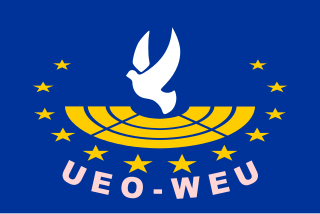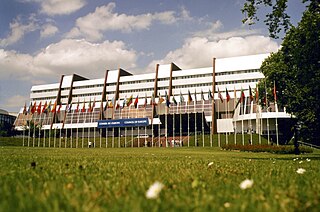The organisation of a Conference of Specialised Ministers is a traditional working method of the Council of Europe.

The Council of Europe is an international organisation whose stated aim is to uphold human rights, democracy and the rule of law in Europe. Founded in 1949, it has 47 member states, covers approximately 820 million people and operates with an annual budget of approximately 500 million euros.
The purpose of such conferences is to define and pursue the goals of the Council of Europe’s intergovernmental activities in their particular fields of competence. These conferences have a quasi-legal identity of their own in international relations. The practice began in Vienna in 1959 with the first Conference of Ministers responsible for Family Affairs. However, the working methods for such conferences were only formalised in 1971 with the adoption of Committee of Ministers Resolution (71) 44., [1] which gives a list of conferences with which the Council of Europe "has a special working relationship".

International relations (IR) or international affairs (IA) — commonly also referred to as international studies (IS), global studies (GS), or global affairs (GA) — is the study of interconnectedness of politics, economics and law on a global level. Depending on the academic institution, it is either a field of political science, an interdisciplinary academic field similar to global studies, or an entirely independent academic discipline in which students take a variety of internationally focused courses in social science and humanities disciplines. In all cases, the field studies relationships between political entities (polities) such as sovereign states, inter-governmental organizations (IGOs), international non-governmental organizations (INGOs), other non-governmental organizations (NGOs), and multinational corporations (MNCs), and the wider world-systems produced by this interaction. International relations is an academic and a public policy field, and so can be positive and normative, because it analyses and formulates the foreign policy of a given state.

Vienna is the federal capital, largest city and one of nine states of Austria. Vienna is Austria's primate city, with a population of about 1.9 million, and its cultural, economic, and political centre. It is the 7th-largest city by population within city limits in the European Union. Until the beginning of the 20th century, it was the largest German-speaking city in the world, and before the splitting of the Austro-Hungarian Empire in World War I, the city had 2 million inhabitants. Today it is the second largest German-speaking city after Berlin and just before Hamburg. Vienna is host to many major international organizations, including the United Nations and OPEC. The city is located in the eastern part of Austria and is close to the borders of Czechia, Slovakia, and Hungary. These regions work together in a European Centrope border region. Along with nearby Bratislava, Vienna forms a metropolitan region with 3 million inhabitants. In 2001, the city centre was designated a UNESCO World Heritage Site. In July 2017 it was moved to the list of World Heritage in Danger.
In February 2008, in the interests of transparency and visibility, the Committee of Ministers decided that all of its ministerial conferences would henceforth include "Council of Europe" in the title. [2]
Several attempts to update this text finally came to fruition in June 2011 with the adoption of Resolution CM/Res(2011)7. [3]
Several of the Conferences are prepared by a special committee of senior officials, which meets solely for that purpose. Others are prepared by the respective Council of Europe steering committee. The Committee of Ministers issues a regular information document "Forthcoming Conferences of Specialised Ministers", which gives the current state of preparation of these conferences. [4]
The Conferences traditionally use a 3-letter abbreviation by which they and their relevant reports and resolutions are readily identified. Although a few of these have changed over the years, most of them have remained remarkably consistent.
The Committee of Ministers currently lists 14 conferences as operational:
- Council of Europe Conference of Ministers responsible for Migration Affairs (MMG)
- Council of Europe Conference of Ministers responsible for Integration Policies for People with disabilities (IPH)
- Council of Europe Conference of Health Ministers (MSN)
- Council of Europe Conference of Ministers of Justice (MJU)
- Council of Europe Conference of Ministers responsible for Spatial/Regional Planning (CEMAT)
- Council of Europe Conference of Ministers responsible for Cultural Affairs (CMC)
- Council of Europe Standing Conference of Ministers of Education (MED)
- Council of Europe Conference of Ministers responsible for Sport (MSL)
- Council of Europe Conference of Ministers responsible for Local and Regional Government (MCL)
- Council of Europe Ministerial Conference on the Media and New Communication Services (MCM)
- Council of Europe Conference of Ministers responsible for Youth (MJN)
- Council of Europe Conference of Ministers responsible for Family Affairs (MMF)
- Council of Europe Ministerial Conference on Equality between Women and Men (MEG)
- Council of Europe Conference of Ministers responsible for Social Cohesion

Human migration is the movement of people from one place to another with the intentions of settling, permanently or temporarily at a new location. The movement is often over long distances and from one country to another, but internal migration is also possible; indeed, this is the dominant form globally. People may migrate as individuals, in family units or in large groups.
Health is a state of physical, mental and social well-being in which disease and infirmity are absent.
The Council of Europe have been organising Conferences of Ministers of Justice (MJU) on a regular basis since 1961. They constitute an important forum of exchange and coordination of legal policy at the pan-European level. They are one of the best known of the Council of Europe's Conferences of Specialised Ministers.
The last of these, the Conference on Social Cohesion, is new, and met for the first time in Moscow in February 2009. [5] There have been a number of other conferences in the past, which are now discontinued. Many of the conferences have undergone several name changes, which make them difficult to trace. They should be distinguished from European Union ministerial conferences. The European Union occasionally convenes ministers in certain sectors (such as culture). [6] Such meetings are often described as informal. [7]
Some of the more successful conferences (e.g. Ministers of Justice) have become virtual institutions in themselves. The Committee of Ministers approves the theme and the organisations and non-member states to be invited.
Each conference makes a report to the Committee of Ministers after the conference, which also examines the possible follow-up to the conference. Several conferences of specialised ministers have only been held once, with no plans for them to meet again, notably :
- Human rights (1985)
- Research (1986)
- Terrorism (1986)
- Movement of persons (1991)
Four other ministerial conferences have been discontinued :
- Ministers of Cultural heritage (MPC), which last met in 1985 (2nd conference ), 1992 (3rd conference), 1996 (4th conference) and 2001 (5th conference)
- Ministers of Environment (MEN), which last met in 1987 (5th conference) and 1990 (6th conference)
- Ministers of Labour (MTV), which last met in 1986 (3rd conference), 1989 (4th conference) and 1993 (5th conference)
- Ministers of Social security (MSS), which last met in 1989 (4th conference), 1992 (5th conference), 1995 (6th conference), 1998 (7th conference) and 2002 (8th conference)











